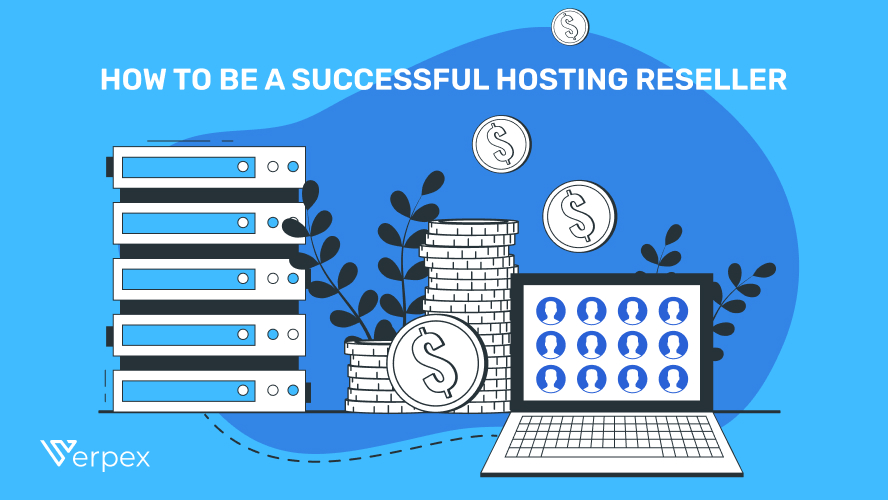Starting as a web hosting reseller can be a profitable venture. It allows you to start your own business with minimal investment.
Web hosting reselling involves buying hosting services from a larger provider and selling them to your clients. This business model offers flexibility and potential for growth. You can set your own prices, design your own plans, and build a customer base.
But, where do you begin? Understanding the basics, choosing the right provider, and setting up your infrastructure are essential steps. This guide will walk you through the initial stages, providing clear and practical advice. By the end, you’ll be equipped to start your web hosting reseller business confidently. Ready to dive in? Let’s explore how to get started in this exciting field.

Credit: www.hostgator.com
Introduction To Web Hosting Reselling
Starting as a web hosting reseller can be a lucrative business. You can earn money by selling web hosting services to other businesses or individuals. You don’t need to manage servers or have technical skills. Instead, you focus on marketing and customer service. This makes it an ideal opportunity for those who want to start a tech business with low investment.
What Is Web Hosting Reselling?
Web hosting reselling involves buying web hosting services from a larger provider. You then sell these services to your own customers. This means you act as a middleman between the main web host and your clients. You can create your own brand and set your own prices. The main provider handles server maintenance and technical support.
Web hosting reselling is a simple way to enter the hosting market. It is less risky and requires less technical knowledge. You focus on attracting customers and providing support. The main host takes care of the rest.
Benefits Of Becoming A Reseller
| Benefit | Description |
|---|---|
| Low Start-Up Costs | You don’t need to invest in expensive infrastructure. |
| Scalability | Start small and grow your business as you gain customers. |
| Branding Opportunity | Create your own brand and pricing structure. |
| Focus on Business Growth | Concentrate on marketing and customer service. |
| Support from Main Provider | Technical issues are handled by the main host. |
Becoming a web hosting reseller has many advantages. You can start with low costs and scale up over time. You also have the freedom to create your own brand. The main provider supports you with technical issues, so you can focus on growing your business.
Choosing The Right Hosting Provider
Choosing the right hosting provider is a crucial step for web hosting resellers. It affects your business success. Your provider should offer reliable services. It should meet your needs and your clients’ needs.
Features To Look For
First, check the uptime guarantee. A high uptime ensures your websites stay online. Look for at least 99.9% uptime. Next, consider the server performance. Fast servers improve website loading times. This keeps users happy.
Check for scalability options. Your needs may grow over time. Your provider should offer easy upgrades. Also, examine the control panel. It should be user-friendly. This helps you manage your accounts better.
Customer support is vital. You may face issues. The provider should offer 24/7 support. Preferably through multiple channels. Lastly, consider the security features. Your provider should offer strong security measures. This keeps your data safe.
Comparing Different Providers
Start by making a list of potential providers. Compare their features side by side. Look at their pricing plans. Ensure they fit your budget. Read customer reviews. They offer insights into the provider’s reliability.
Check if they offer a money-back guarantee. This shows confidence in their service. Compare their customer support quality. Test their response times. Evaluate the ease of use of their control panel. A complicated panel can waste your time.
Look at the extra features. Some providers offer free backups. Others provide free domain registration. These extras can add value. Finally, consider their scalability options. Ensure they can grow with you.
Setting Up Your Reseller Account
Start by choosing a reliable web hosting provider. Then, create your reseller account and customize your hosting plans. Finally, market your services to attract clients.
Getting started as a web hosting reseller can be exciting. Setting up your reseller account is the first step. This process ensures you have the right tools to succeed. Follow these steps to set up your account.Registration Process
The first step is to register for a reseller account. Visit the hosting provider’s website. Find the reseller section. Fill out the registration form. Provide accurate details. This includes your name, email, and business information. Choose a reseller plan that fits your needs. Submit the form. Check your email for a confirmation link. Click the link to verify your account. Once verified, you will receive login details. Use these to access your reseller dashboard.Configuring Your Account
Log in to your reseller dashboard. Begin by customizing your account settings. Set up your branding. Add your logo and business name. Configure your pricing. Decide how much to charge your clients. Create hosting packages. Offer different plans for your clients. Include options for storage, bandwidth, and email accounts. Set up your payment gateway. Ensure you can receive payments from clients. Add your domain. Register a new domain or use an existing one. Configure your domain settings. Ensure your domain points to your reseller account. Test your setup. Create a test account. Ensure everything works smoothly. This includes account creation, payment processing, and email functionality. Once satisfied, start marketing your reseller services. Reach out to potential clients. Offer promotions and discounts. Setting up your reseller account is an essential step. Follow these guidelines to ensure a smooth start. “`Understanding Hosting Plans And Packages
Understanding hosting plans and packages is essential for new web hosting resellers. This knowledge helps you cater to different clients’ needs and grow your business. Offering the right plans ensures your clients stay happy and loyal.
Types Of Hosting Plans
Different types of hosting plans exist to serve various needs. Shared hosting is affordable and suitable for small websites. Many websites share the same server resources. VPS hosting offers more control and resources. It is suitable for medium-sized websites. Dedicated hosting provides an entire server for one client. It is ideal for large websites with high traffic. Cloud hosting is flexible and scalable. It uses multiple servers to ensure uptime and performance.
Customizing Packages For Clients
Customizing packages helps you attract more clients. Assess their needs and create tailored solutions. Offer flexible plans to meet their requirements. Include features like storage, bandwidth, and email accounts. Provide additional services such as backups, security, and support. This adds value to your packages. Ensure your pricing is competitive and transparent. Clients appreciate clear communication and fair pricing.
Pricing Your Hosting Services
Setting the right price for your web hosting services is crucial. It affects your profits and how customers perceive your service. This guide will help you price your hosting services effectively.
Determining Costs
First, list all your expenses. These include server costs, software licenses, and support costs. Don’t forget to include marketing and administrative expenses. Understanding your total costs helps you set a base price.
Next, calculate your break-even point. This is the amount you need to charge to cover all your costs. Knowing this number ensures you won’t lose money.
Creating Competitive Pricing
Research your competitors. Look at what others charge for similar services. This helps you understand the market and find a competitive price point.
Consider offering tiered pricing. Create different packages for different needs. This allows you to attract a wider range of customers.
Offer value-added services. Include features like extra storage or free backups. These can justify a higher price and attract more customers.
Finally, review and adjust your pricing regularly. The web hosting market changes quickly. Stay updated to remain competitive and profitable.
Building Your Brand
Starting as a web hosting reseller can be a profitable venture. One crucial step is building your brand. A strong brand helps you stand out and attract customers. Here’s how to get started:
Creating A Professional Website
Your website is the face of your business. It must look professional and function well. Here are some tips:
- Choose a clean, modern design.
- Ensure your site loads quickly.
- Make it easy to navigate.
- Include clear, concise content.
- Add a blog to share news and tips.
Use a reliable content management system (CMS) like WordPress. It offers many themes and plugins. Also, ensure your site is mobile-friendly. Many users access websites via smartphones.
Marketing Strategies
Effective marketing helps you reach more potential customers. Here are some strategies:
- Content Marketing: Write blogs and create videos about web hosting.
- Social Media: Use platforms like Facebook and Twitter to engage with users.
- Email Marketing: Send newsletters to keep customers informed.
- SEO: Optimize your site for search engines to attract organic traffic.
- Paid Ads: Use Google Ads and social media ads for more visibility.
Track your marketing efforts. Use tools like Google Analytics to see what works best. Adjust your strategies based on the data. Consistent effort is key to building a strong brand presence.
Managing Customer Support
Managing customer support is vital for success as a web hosting reseller. Happy clients stay longer and bring in new customers. To achieve this, you must provide effective technical support and handle client issues with care.
Providing Technical Support
Technical support is the backbone of your web hosting service. Clients expect quick and efficient solutions to their problems. Here are some key points to consider:
- Be Available 24/7: Hosting issues can arise at any time. Ensure you have a support system in place around the clock.
- Knowledgeable Staff: Train your support team well. They should be able to handle common hosting issues like server downtime, email problems, and website errors.
- Use Help Desk Software: Implement a help desk system to manage and track support tickets. This ensures no issue goes unresolved.
Handling Client Issues
Effective problem-solving is key to maintaining client trust. Here’s how you can handle client issues efficiently:
- Listen Actively: Understand the client’s problem fully before offering solutions. This builds trust and ensures you address the real issue.
- Communicate Clearly: Use simple language. Avoid technical jargon when explaining the problem and its solution.
- Follow-Up: After resolving an issue, follow up with the client. Ensure they are satisfied with the solution.
- Feedback: Encourage clients to give feedback. This helps improve your support services.
By focusing on these aspects, you can manage customer support effectively. Happy customers mean a thriving business.

Credit: verpex.com
Scaling Your Reseller Business
Scaling your reseller business means growing beyond your initial setup. This involves attracting more clients and improving your service offerings. Let’s explore how you can achieve this growth effectively.
Expanding Your Client Base
To expand your client base, focus on effective marketing strategies. Begin with a solid online presence. Create a professional website showcasing your services. Utilize social media to reach a broader audience. Engage with potential clients by sharing valuable content.
Consider offering special promotions to attract new clients. For example, you could provide a discount for the first three months. Referral programs can also encourage your current clients to bring in new business.
Networking is crucial. Attend industry events and join online forums related to web hosting. Connect with small businesses and freelancers who might need your services. Building relationships can lead to new opportunities.
Upgrading Your Services
Upgrading your services is essential to retain clients and attract new ones. Start by offering additional features like SSL certificates, domain registration, and email hosting. These extras add value to your basic hosting packages.
Ensure your servers are reliable and fast. Clients expect their websites to load quickly and be available 24/7. Consider investing in better server hardware or switching to a more robust hosting provider.
Customer support is a key differentiator. Offer 24/7 support via live chat, email, or phone. Clients appreciate quick and helpful responses to their issues. Providing excellent support can set you apart from competitors.
Regularly update your service offerings. Stay current with the latest hosting technologies and trends. This keeps your business relevant and appealing to potential clients.
By expanding your client base and upgrading your services, you can effectively scale your reseller business. These strategies will help you grow and succeed in the competitive web hosting market.
Legal And Financial Considerations
Starting as a web hosting reseller involves more than just understanding the technical side. Legal and financial considerations are crucial. They ensure your business runs smoothly and avoids future issues. Focusing on these areas early will save you from potential problems down the road. Let’s dive into the key aspects.
Understanding Contracts
Read your reseller contract carefully. Understand all terms and conditions. This includes uptime guarantees and support obligations. Know the penalties for breaking the contract. Also, be aware of the renewal terms. Some contracts renew automatically. You should know how to cancel if needed. If anything is unclear, consult a legal expert. This ensures you don’t agree to unfavorable terms.
Managing Finances
Keep your personal and business finances separate. Open a business bank account. Track all income and expenses accurately. Use accounting software to help with this. Plan for taxes early. Know the tax laws in your area. Set aside money for tax payments. Also, create a budget. This helps you manage your resources effectively. Monitor your cash flow regularly. Good financial management keeps your business stable.

Credit: www.youtube.com
Conclusion And Next Steps
Starting as a web hosting reseller can seem daunting. But with the right steps, you can set a solid foundation. Let’s review the key points and plan for your future success.
Reviewing Key Points
First, choose a reliable hosting provider. Look for features that suit your needs, such as:
- Strong uptime guarantees
- Good customer support
- Scalable plans
Next, determine your target market. Who are your potential clients? Consider small businesses, freelancers, or bloggers. Understanding your audience helps tailor your services.
Then, set competitive prices. Research your competitors. Offer packages that provide value but still generate profit.
Create a user-friendly website. Showcase your services and make it easy for clients to sign up. Include testimonials and case studies to build trust.
Finally, market your services. Use social media, content marketing, and email campaigns to reach your audience. Consistent efforts will grow your client base.
Planning For The Future
As your business grows, plan for future expansion. Consider these steps:
- Upgrade your hosting plan. More clients may need more resources.
- Hire support staff. Ensure quick and efficient customer service.
- Expand your offerings. Add services like website design or SEO.
- Stay updated. Follow industry trends and adapt your strategies.
Track your progress. Use tools to monitor your website traffic and customer satisfaction. Regular reviews help you improve and stay on track.
Finally, stay motivated. Building a successful reseller business takes time and effort. Celebrate your wins and learn from challenges.
Starting as a web hosting reseller is a journey. By following these steps, you can build a thriving business. Good luck!
Frequently Asked Questions
What Is A Web Hosting Reseller?
A web hosting reseller purchases hosting services wholesale and sells them to clients. They act as intermediaries between hosting providers and customers.
How Do I Start As A Web Hosting Reseller?
To start, choose a reliable hosting provider, purchase a reseller plan, and create hosting packages for your clients.
How Much Does It Cost To Become A Web Hosting Reseller?
The cost varies by provider but typically starts around $20 per month. Prices depend on features and resources included.
What Skills Do I Need To Be A Web Hosting Reseller?
Basic technical knowledge, customer service skills, and marketing abilities are essential. Familiarity with hosting control panels is also beneficial.
Conclusion
Starting as a web hosting reseller can be rewarding. Follow the right steps. Choose a reliable hosting provider. Understand your target market. Set competitive prices. Offer excellent customer support. Promote your services effectively. Keep learning and adapting. Success requires dedication and patience.
Begin your journey today. You have the tools to succeed. Good luck!





